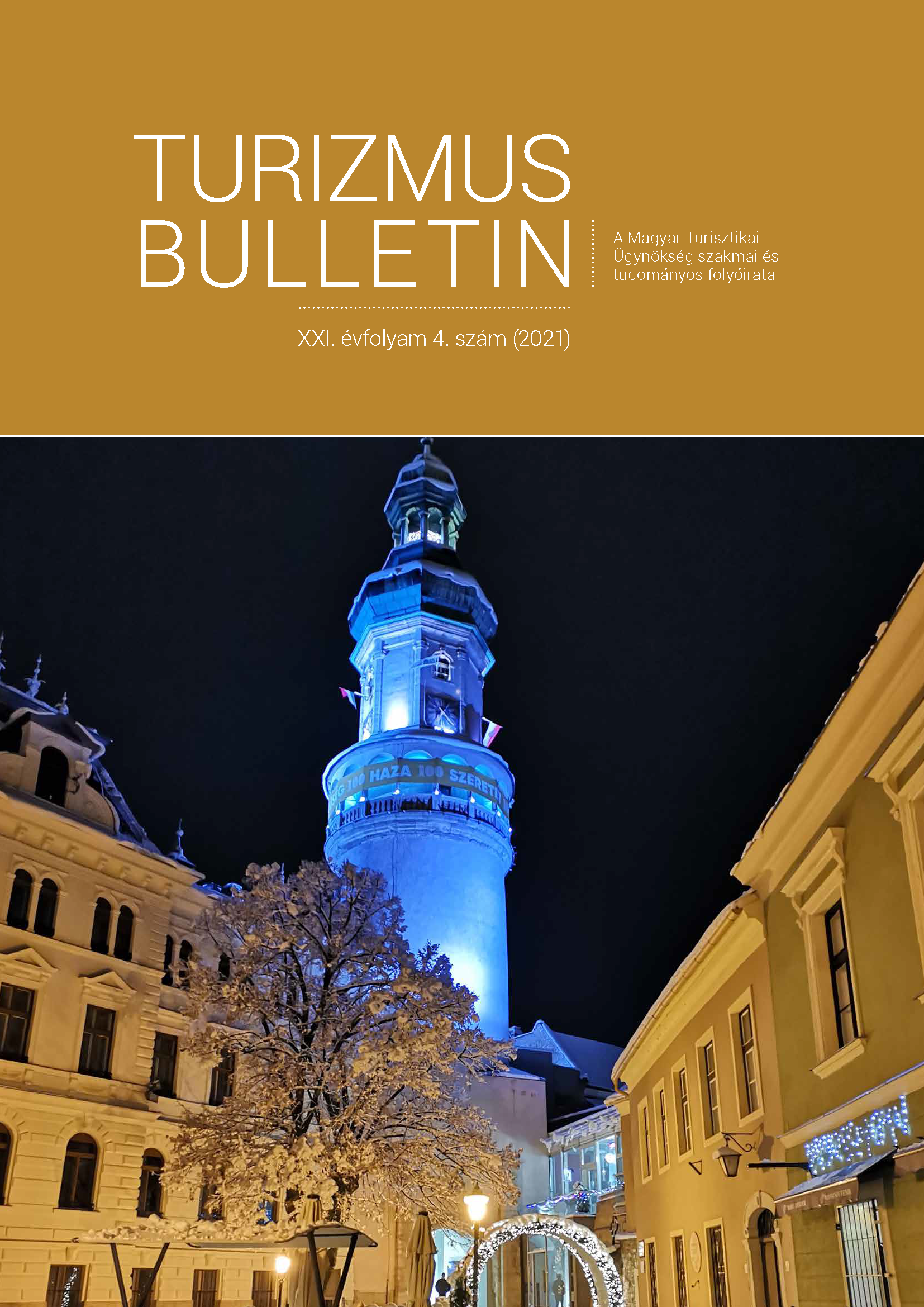Buli van? – Mitől lehet vonzó Budapest VII. kerülete a hazai fogyasztók számára?
DOI:
https://doi.org/10.14267/TURBULL.2021v21n4.5Kulcsszavak:
túlturizmus, élmény, genius loci, bulinegyed, újrapozícionálásAbsztrakt
A 2020 elején begyűrűzött Covid19-járvány előtt a túlturizmus jelenséggel érintett budapesti bulinegyed szinte egyik napról a másikra csendesedett el. Az újraindítás a „hogyan tovább”-ot illetően számos megválaszolásra váró kérdést vet fel. Jelen tanulmány kiindulási alapjául a túlturizmus és az élmény szolgál. Kutatási kérdésünk arra irányul, hogy mitől lehet vonzó Budapest VII. kerülete a szabadidős fogyasztók és a belföldi turisták egyes, generációk mentén képzett szegmensei számára? Kérdésünk megválaszolásához a narratívaelemzést hívtuk segítségül, amelynek elvégzése a fogyasztók által emlékezetesnek ítélt élmény mélyebb szintű megértését és a kerület genius locijának azonosítását célozta. A narratívák alapján a VII. kerület olyan történelmi, kulturális, művészeti és társadalmi értékekkel rendelkezik, amelyeken keresztül azonosítható a fogyasztók minden generációja számára vonzó genius loci.
Hivatkozások
AHO, S. (2001): Towards a general theory of touristic experiences: Modelling experience process in tourism. Tourism Review. 56(3–4). pp. 33–37. https://doi.org/10.1108/eb058368
APOLLO, M. – RETTINGER, R. (2019): Mountaineering in Cuba: Improvement of true accessibility as an opportunity for regional development of communities outside the tourism enclaves. Current Issues of Tourism. 22(15). 1797–1804. https://doi.org/10.1080/13683500.2018.1446920
BINKHORST, E. – DEKKER, T. (2009): Agenda for Co-Creation Tourism Experience Research. Journal of Hospitality Marketing & Management. 18(2–3). pp. 311–327. https://doi.org/10.1080/19368620802594193
BUTLER, R. W. (1980): The concept of tourism area cycle of evolution: implications for management of resources. Canadian Geographer. 24(1). pp. 5–12. https://doi.org/10.1111/j.1541-0064.1980.tb00970.x
CARU, A. – COVA, B. (2007): Consumption Experience. Routledge, London.
CHRISTOU, P. A. – FARMAKI, A. – SAVERIADES, A. – SPANOU-TRIPINIOTI, E. (2019): The “genius loci” of places that experience intense tourism development. Tourism Management Perspectives. 30. 2019. pp. 19–32. https://doi.org/10.1016/j.tmp.2019.01.002
DOXEY, G. V. (1975): A causation theory of visitor/resident irritants: Methodology and research inferences. Proceedings of the Travel Research Association 6th Annual Conference. pp. 195–198.
GARCIA, D. M. M. (2018): Dark Tourism: Understanding the factors that create memorable tourism experience in the case of Millenials. Budapesti Corvinus Egyetem, Budapest.
HORVÁTH D. – MITEV A. (2015): Alternatív kvalitatív kutatási kézikönyv. Alinea, Budapest.
KELEMEN-ERDŐS A. – MITEV A. (2020): Eszképizmustól az ajánlásig – Élményfokozatok és hatásai a romkocsmákban. Turizmus Bulletin. 20(2). pp. 14–21. https://doi.org/10.14267/TURBULL.2020v20n2.2
KIM, J. – RITCHIE, J. – McCORMICK, B. (2012): Development of a Scale to Measure Memorable Tourism Experiences. Journal of Travel Research. 51(1). pp. 12–25. https://doi.org/10.1177/0047287510385467
KOENS, K. – POSTMA, A. – PAPP, B. (2018): Is Overtourism Overused? Understanding the Impact of Tourism in a City Context. Sustainability. 10(1)2. 4384. https://doi.org/10.3390/su10124384
KRUCZEK, Z. (2019): Ways to Counteract the Negative Effects of Overtourism at Tourist Attractions and Destinations. Annales Universitatis Mariae Curie-Sk odowska Seria B. 74. 2019. pp. 45–57. DOI: 10.17951/b.2019.74.45-57.
KULCSÁR N. (2015): A fogyasztói érték és az élmény kontextusa a turisztikai szakirodalomban. Vezetéstudomány. 46(3). pp. 18–25. https://doi.org/10.14267/veztud.2015.03.02
LENGYEL A. (2019): A mindfulness és liminalitás felértékelődése: spirituális elvonulási központok, a fenntartható jövő desztinációi? Turizmus Bulletin. 19(1). pp. 14–24.
MICHALKÓ G. – IRIMIÁS A. (2011): Csalódásmenedzsment a turizmusban: új szemlélet a turisztikai célterületek irányításában. Marketing & Menedzsment. 45(2). pp. 4–10.
MICHALKÓ G. – RÁTZ T. (2005): A kulturális turizmus élmény-gazdaságtani szempontjai. In: Enyedi Gy. – Keresztély K. (szerk.): A magyar városok kulturális gazdasága. Magyarország az ezredfordulón. Stratégiai ta¬nulmányok a Magyar Tudományos Akadémián. MTA Társadalomkutató Központ, Budapest. pp. 123–141.
MITEV A. – KELEMEN-ERDŐS A. (2017): Romkocsma mint bricolage: Élményközpontú szolgáltatásérték-teremtés a romkocsmákban. Turizmus Bulletin. 17(1-2). pp. 26–34.
SMITH, M. K. – PINKE-SZIVA, I. – OLT, G. (2019): Overtourism and Resident Resistance in Budapest. Tourism Planning & Development. 16(4). pp. 376–392. https://doi.org/10.1080/21568316.2019.1595705
PINE, B. J. – GILMORE, J. H. (1998): Welcome to the Experience Economy. Harvard Business Review. 76(4). pp. 96–105.
PINKE-SZIVA, I. – SMITH, M. – OLT, G. – BEREZVAI, Z. (2019): Overtourism and the night-time economy: a case study of Budapest. International Journal of Tourism Cities. 5(1). pp. 1–16. https://doi.org/10.1108/ijtc-04-2018-0028
PINKE-SZIVA I. – KENESEI ZS. – KISS K. – KOLOS K. – KOVÁCS E. – MICHALKÓ G. (2020): Társadalmi innováció a városi desztinációk versenyképességének szolgálatában. Fókuszban az éjszakai gazdaság hatásainak menedzselése. Vezetéstudomány. 51(7–8). pp. 2–12. https://doi.org/10.14267/VEZTUD.2020.07-08.01
PIZAM, A. – MILMAN, A. (1986): The Social Impacts of Tourism. Tourism Recreation Research. 11(1). pp. 29–33.
SZABÓ K. – HÁMORI B. (2006): Információgazdaság. Digitális kapitalizmus vagy új gazdasági rendszer? Akadémiai Kiadó, Budapest.
UNWTO (2018): Overtourism? Understanding and managing urban tourism growth beyond perceptions. Madrid. pp. 1–12. https://doi.org/10.18111/9789284419999
VECCO, M. (2020): Genius loci as a meta-concept. Journal of Cultural Heritage. 41(1). pp. 225–231. https://doi.org/10.1016/j.culher.2019.07.001
ZÁTORI A. (2014): A turisztikai élményteremtés vizsgálata szolgáltatói szemszögből. Doktori (PhD) értekezés. Budapesti Corvinus Egyetem, Budapest. https://doi.org/10.14267/phd.2014055
ZÁTORI, A. – SMITH, M. K. – PUCZKÓ, L. (2018): Experience-involvement, memorability and authenticity: The service provider’s effect on tourist experience. Tourism Management. 67. (August, 2018) pp. 111–126. https://doi.org/10.1016/j.tourman.2017.12.013
ZEMLA, M. (2020): Reasons and Consequences of Overtourism in Contemporary Cities – Knowledge Gaps and Future Research. Sustainability. 12(5). 1729. https://doi.org/10.3390/su12051729
Internetes források
PINKE-SZIVA I. (2021): A bulinegyed után is van élet: így alakulhat át Budapest a túlturizmus és a nullturizmus sokkja után. https://forbes.hu/uzlet/budapest-korona-turizmus-bulinegyed/, Letöltve: 2021. március 26.

